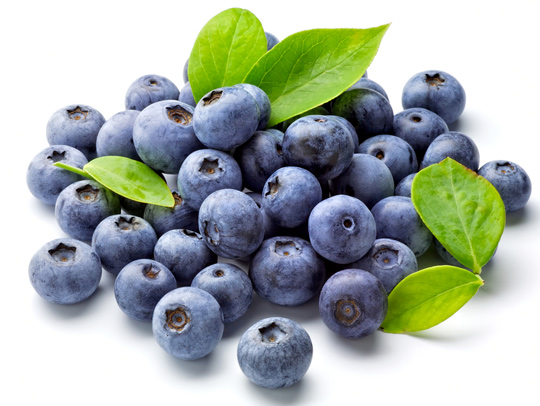Celebrate American Heart Month with a Boost of Blue(berries)
February 2, 2021 | 4 min to read

FOLSOM, Calif. – During American Heart Month, the U.S. Highbush Blueberry Council (USHBC) is encouraging consumers to grab a boost of blue. In addition to an overall healthy diet and lifestyle, enjoying blueberries (fresh and frozen) is one of the small, daily choices that may add up to support heart health. In a month-long promotional campaign, USHBC will share recipes, nutritional information and other content to reinforce blueberries as a deliciously simple, snackable and healthy option. Health professional partners, including program spokesperson, Maya Feller, MS, RD, CDN, will contribute original content to the program, which also will include promotions, videos, social media content, email marketing and digital advertising.
Each year, American Heart Month offers an opportunity to focus on the vital importance of heart health; the leading cause of death for men and women in the United States is heart disease.[i] A growing body of scientific evidence demonstrates that blueberries can be part of eating patterns to improve cardiovascular health, especially as part of an overall healthy lifestyle.[ii], [iii], [iv], [v]
The February promotion is the first of six “power periods” that are part of Grab a Boost of Blue, a strategic positioning and call to action backed by new tools and consumer research for retailers. In connection with promotions throughout the year, Grab a Boost of Blue is designed to tap into consumers’ passion for blueberries and increase consumption.
Blueberries, whether fresh or frozen, offer a variety of beneficial vitamins and minerals, including vitamin C, vitamin K, manganese and potassium. For busy people and families on the go, blueberries make a no-stress/low-stress snack or addition to any dish. They’re a good source of fiber, containing 3.6 grams of fiber and only 80 calories per serving (one cup, or approximately a handful). According to the Dietary Guidelines for Americans, a healthy dietary pattern, which includes a higher intake of fruits, is associated with a reduced risk of many chronic diseases, including cardiovascular disease.[vi]
Blueberries are certified as heart-healthy through the American Heart Association (AHA)® Heart-Check Food Certification Program. USHBC continues to encourage industry-wide adoption of the official heart-check mark on blueberry packaging and throughout online, print and other promotional materials and activities.
“Each February, American Heart Month gives us an opportunity to embrace heart-healthy habits – such as incorporating blueberries and other nutritious foods into our daily diet,” said Kasey Cronquist, president of the U.S. Highbush Blueberry Council. “It’s uniquely simple and delicious to grab a boost of blue, and we’re excited to partner with trusted health professionals to share exciting new ways to enjoy fresh and frozen blueberries.”
The American Heart Association’s® distinctive red-and-white mark offers shoppers an easy, reliable way to identify heart-healthy foods that can be part of a sensible eating plan. The certification program uses transparent, science-based criteria regarding healthy dietary recommendations, food categories, specific product ingredients and nutrient values. They are consistent with relevant government regulatory standards for making coronary heart disease claims. Almost all Americans (95%) report that they sometimes or always look for healthy options while food shopping, according to a recent survey conducted by the International Food Information Council and the AHA. More than two-thirds of consumers (67%) actively look for Heart-Check Mark items at retail and purchase them on a regular basis.[vii]
###
About the U.S. Highbush Blueberry Council
The U.S. Highbush Blueberry Council is an agriculture promotion group, representing blueberry growers and packers in North and South America who market their blueberries in the United States and overseas, and works to promote the growth and well-being of the entire blueberry industry. The blueberry industry is committed to providing blueberries that are grown, harvested, packed and shipped in clean, safe environments. Learn more at blueberrycouncil.org.
_____________________________________________________________________________________________________________________________________
[i] Heart Disease and Stroke Statistics – 2020 Update: A Report from the American Heart Association(2021, January 132). Retrieved from https://www.ahajournals.org/doi/10.1161/CIR.0000000000000757
[ii] Basu, A., Du, M., Leyva, M. J., Sanchez, K., Betts, N. M., Wu, M., … Lyons, T. J. (2010). Blueberries Decrease Cardiovascular Risk Factors in Obese Men and Women with Metabolic Syndrome. The Journal of Nutrition, 140(9), 1582-1587. doi: 10.3945/jn.110.124701
[iii] Johnson, S. A., Figueroa, A., Navaei, N., Wong, A., Kalfon, R., Ormsbee, L. T., … Arjmandi, B. H. (2015). Daily Blueberry Consumption Improves Blood Pressure and Arterial Stiffness in Postmenopausal Women with Pre- and Stage 1-Hypertension: A Randomized, Double-Blind, Placebo-Controlled Clinical Trial. Journal of the Academy of Nutrition and Dietetics, 115(3), 369-377. doi: 10.1016/j.jand.2014.11.001
[iv] Stull, A., Cash, K., Champagne, C., Gupta, A., Boston, R., Beyl, R., … Cefalu, W. (2015). Blueberries Improve Endothelial Function, but Not Blood Pressure, in Adults with Metabolic Syndrome: A Randomized, Double-Blind, Placebo-Controlled Clinical Trial. Nutrients, 7(6), 4107-4123. doi: 10.3390/nu7064107
[v] Curtis, P. J., Van Der Velpen, V., Berends, L., Jennings, A., Feelisch, M., Umpleby, A. M., … Cassidy, A. (2019). Blueberries improve biomarkers of cardiometabolic function in participants with metabolic syndrome—results from a 6-month, double-blind, randomized controlled trial. The American Journal of Clinical Nutrition, 109(6), 1535-1545. doi: 10.1093/ajcn/nqy380
[vi] U.S. Department of Agriculture and U.S. Department of Health and Human Services. Dietary Guidelines for Americans, 2020-2025. 9th Edition. December 2020. Available at DietaryGuidelines.gov
[vii] Technomics – Consumer Evaluation Of Foodservice Heart Check Program – June 2016
